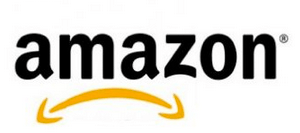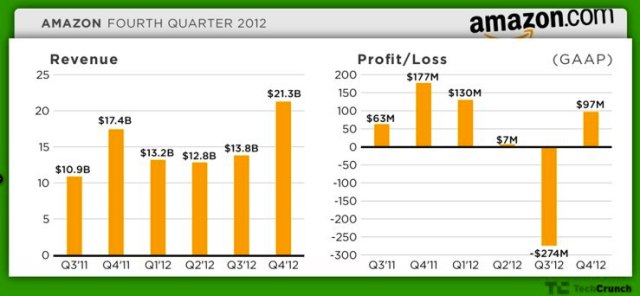You really have to hand it to Jeff Bezos and Amazon, which seem to continuously defy reality — and gravity. Amazon just announced its fourth-quarter earnings, and if you listen to the press, you’d think it was another home run. And if you are watching Amazon trade after-hours, you’d think this is the most buyable stock since the last time MG wrote about AAPL. Amazon is up nearly 10 percent since the market closed and, as Reuters points out to wit, the stock hit a record high on January 25th.
In part that’s because, yes, Amazon is the Walmart of the Internet, an the e-commerce giant. Thanks to network effects, it’s impossible to ignore. In fact, I’m using it to buy a tinfoil hat right now. The other contributing factor is, of course, that Amazon increased its revenues, or global sales, by 22 percent to $21.27 billion in the fourth quarter.
That’s huge, right? The list of companies doing $21 billion in revenue in the fourth quarter isn’t long.
Cue the confetti.
Those who regularly have the distinct pleasure of listening to Amazon’s quarterly conference call for investors know that the company rarely says anything of substance in these calls. Usually, executives deflect questions, reading canned lines and sticking to the appropriate PR speak. But this quarter’s investor call may have been the shortest in history.
That’s probably because Amazon’s press release only tells one side of the story, and executives probably aren’t too eager to respond to any of those pesky naysayers. Here’s why: In spite of its $21 billion in sales, Amazon underperformed compared to analysts’ expectations. Of course expectations were high thanks to the usual holiday shopping bump for retail and e-commerce, but Amazon was expected to hit $0.27 EPS and $22 billion in revenues, and Amazon instead underperformed, coming in at $0.21 and $21 billion, respectively.
That may not sound like a lot, and Amazon executives clearly think there isn’t much to be worried about, especially considering the company has $8 billion in cash. That’s nothing to scoff at, clearly, but there’s also the fact that the company’s net income decreased by 45 percent in the fourth quarter and growth is slowing. Amazon saw just $97 million in net profits in Q4. Yes, $97 million. That would be a big win for a company with $1 billion in revenue, but I’m probably not going out on a limb to say that it’s a red flag when you’re doing $21 billion.
If you look at the profit/loss graph in Leena’s post from earlier today [also included at the bottom of this post], one sees that Amazon hasn’t tallied more than $177 million in profits … well, for quite some time.
What’s more, as Zero Hedge points out, it’s almost comical that Amazon’s stock jumped after-hours. The irrationality of the markets in top form. The stock shot up this afternoon even after Amazon lowered its top-line guidance, projecting sales of between $15 to $16 billion, along with operating income.
On top of that, Amazon’s physical book sales had the slowest growth rate it’s seen in the last 17 years. Of course, thanks to the new age of eBooks and its quarterly increases in revenue, Amazon has continued hiring, growing its staff to a record 88,400 in 2012. Meanwhile, global net sales saw the slowest year-over-year growth in recent memory, down 30 percent from Q3 and down 34 percent from Q4 2011.
But here’s the real kicker: As Zero Hedge has pointed out, the company’s LTM net income is “now officially negative.” From Zero Hedge, that means that “as of this moment, the company with the idiotically high PE has an even more idiotic N/M PE.” In other words, N/M represents the correlation between the company’s market cap and its net income is now negative. [See the last graph here.]
Paul Vigna of the WSJ also noticed this P/E horror today, saying:
For the year, the company reported a loss of $39 million, or 9 cents a share, compared to net income of $631 million, or $1.37 a share, in 2011. Incidentally, that means the company doesn’t actually have a trailing-12-months price-to-earnings ratio, since there were no earnings for the past 12 months.
Yep, you read that correctly. There were no earnings for the past 12 months.
HUZZAH! Hooray! Take my money, please. Take it!
For some reason, the fact that Amazon is dealing with 1.9 percent margins, halting guidance, slowing growth, earnings and income misses and tiny profits seems not to matter to investors. People continue to buy Amazon stock, and the stock market at large continues to push higher as the Fed continues dumping money into banks instead of lending. But, don’t worry, Paul Krugman says everything is going to be fine. Phew.
Well, you’ll have to pardon me, Paul, but I think I’m going to go against the grain on this one and offer the world’s slowest slow clap to Amazon while continuing to hoard all of my cash under my mattress and consider a move to Antartica. Next thing we know Bitcoins will be the new standard.
I know Jeff Bezos has a giant brain and everything, but it’s hard not to look at Amazon earnings, mixed with the overall macroeconomic conditions, and not feel slightly to moderately nauseous. Or like you need a strong drink.
More in Leena’s coverage here.
NOTE/UPDATE: Before the heavy, mediocre breath from the confederacy of dunces gets too thick, let’s get a few things straight. Amazon is an incredible business, offers extremely valuable services and has weaved itself into the very fabric of American (and soon global) commerce. As such, it’s part of one of the fastest growing market segments on the planet. I’m not suggesting Amazon is going anywhere anytime soon, nor should it. It’s not going to crash, lay everyone off and run around like a chicken with its head cut off.
Yes, part of the reason Amazon demonstrates such low profits is because of the amount of investment it has been pouring into innovation and infrastructure and diversification across what seems like 50 different markets and categories. That’s not rocket science. But therefore, no one should expect the company to be remotely profitable, right? Who cares, it totally makes AWS, geeks declare. And earnings shouldn’t enter the picture when you have a top line like that, right?
No. I’d say there’s a very strong argument in favor of the fact that Amazon is going way too far in this direction and is heading for a reality check.
Yes, Amazon credit for its focus on innovation. Case in point: Yesterday, the company launched Elastic Transcoder, a new service that “lets people upload digital video and put it into formats — h264, AAC and mp4 for now — that are usable on devices like smartphones and tablets, as well as PCs,” according to Ingrid. That’s a lot of free and cheap transcoding for the masses, potentially a threat to Zencoder and the Netflixes of the world.
Amazon has an enormous distribution mechanism — enormous — and has come to represent the classic case of long-tail domination. It staves off its flagging original core business (book sales) by out-innovating in video, giving Netflix a run for its monies. Amazon is busy expanding the size of the video streaming market with its products, creating parellel models without having to appeal to Netflix (or anyone else’s) core user base.
But Amazon is at risk of over-extending. It doesn’t break out numbers for the Kindle Fire, even though we’re told they’re totally doing fine. No, they’re contributing to the losses, which is fine for the company if it makes money elsewhere. But it’s not doing itself any favors by trying to lock users into its ecosystem around a mobile touchpoint that isn’t really up to snuff, even if it elbows users into having to buy it as its other businesses mature around it. None of this inspires confidence.
As Seeking Alpha points out, Amazon is nearly one-tenth the size of Walmart on the top line and, “while Walmart numbers there have grown just 10 percent in the last two years, it has in fact added nearly $39 billion in sales” … in turn, “Amazon’s 2011 sales were $48 billion.” Yet another reason this is unsustainable. The higher the numbers get the more pressure there is to maintain them. Icarus flies too high, etc.
And, yes, AWS is a juggernaut. We get it. It leads among cloud developers, is a point of pride for Amazon (as it should be). Amazon analysts claim that it could be a $19 billion business on its own or worth $30 billion at an 8x multiple. Of course, many fanboys claim that this is where Amazon will make all of its money, in digital and cloud services like these where margins are higher. But nothing about that makes you nervous?
All this is based on numbers Amazon doesn’t provide. It doesn’t break out its AWS margins and revenue, just to be clear. One analyst gives AWS 500+ gross margin points by 2015. Are you serious? And saying that when Amazon goes down and takes down a lot of familiar websites and startups with it, that it is somehow indispensable and therefore brilliant is just ridiculous.
Sure, Amazon is probably making money on AWS, but how much? We don’t know. 500+ points? No way. In fact, if you’ve been paying attention AWS has proven to be pretty unreliable over the last year and there’s no reason to believe that its unreliability somehow gives it more appeal as Amazon tries to court enterprise customers. Why wouldn’t they choose Rackspace … or, say, Google.
Sure, Amazon management looks brilliant because it goes against the grain and is willing to grind profits down to next to nothing for a long period of time to invest in growth areas and innovate. That’s great, but that can’t last forever. The fact that the majority of Amazon analysts consistently rate it a “strong buy” quarter after quarter is another sign that the motley fool momentum of its stock is bound to change. As Seeking Alpha notes, “the laws of economics deem that Amazon’s current business model is unsustainable and will continue to generate less and less marginal growth, to the point where we actually end up seeing negative returns produced by management.”
You can only give the middle finger to your long-term shareholders for so long before things get hairy. I think that point is coming very soon for Amazon. But, hey, I’m just one guy.































Comment